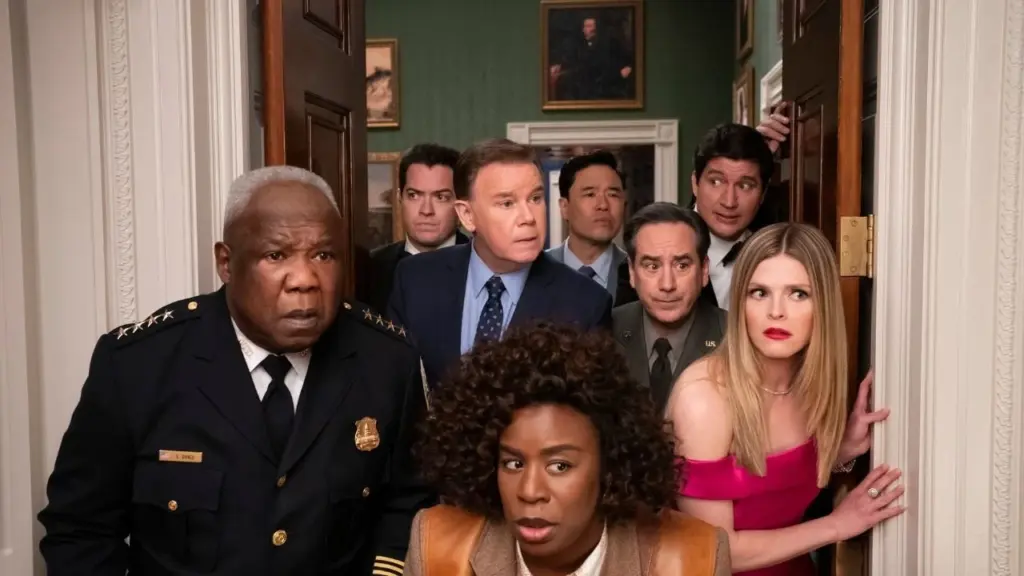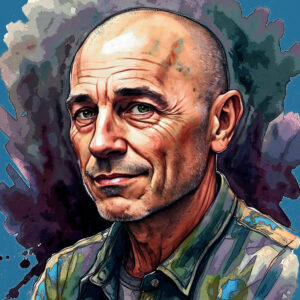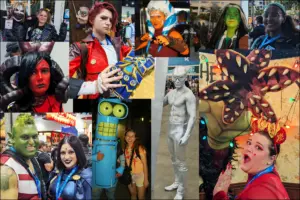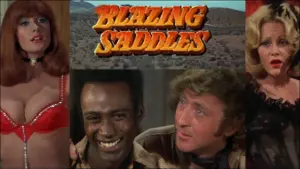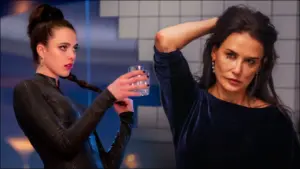If you’re waiting for the next Knives Out movie (Wake Up Dead Man, in December 2025), or just a fan of complicated whodunits with slick, modern approaches, Netflix’s The Residence — a stand-alone series with the quality of a movie — will take you on a fine, fun ride. Though released in March 2025, word-of-mouth recommendations have put it in a lot of summertime queues.
This Shondaland Production (thank you Shonda Rhimes, veteran of Grey’s Anatomy, Scandal and other hits) boasts a stellar cast, a pinpoint-sharp eye for details, and a deft editing approach that swirls through suspect interviews, a Congressional hearing, and story flashbacks with the pace of a showoffy tapdancer avoiding machine-gun bullets.
Along the way, The Residence gives viewers a vividly rendered, three-dimensional understanding of The White House, where the mystery unfolds. During the hubbub of a formal state dinner attended by the Australian prime minister and other dignitaries, the White House’s Chief Usher (sort of a SuperButler) is found dead on the floor of an upstairs recreation room. And we’re off — let the unraveling mystery begin.
The Usher, played by Giancarlo Esposito in his best “noteworthy death” role since he, uh, faced down Walter White in Breaking Bad, is the longtime manager of the White House’s central domestic zone — coordinating its kitchen staff, room maintenance, social schedule, and day-to-day upkeep from one presidential administration to the next. His name, A.B. Wynter, suggests a cool demeanor, but over the course of many flashbacks we find that the Esposito character’s main trait is competence in the face of other people’s hot-blooded mayhem. Nonetheless, the gaggle of White House staff members (not to mention the extended First Family and the president’s advisers) all turn out to have possible motives for wanting Wynter dead and out of the way.
There are at least eight possible suspects, maybe more, out of well over two dozen recurring characters. This White House is loaded with red herrings, and The Residence requires eight jam-packed episodes (including a feature-length summation finale) to sift through them all. It’s quite substantial, in all the best ways if you’re a mystery buff, and perhaps some patience-pushing ways if you’re not. But c’mon… Knives Out won’t be here till winter. And even a fictional White House with a bloody murder and dysfunctional staff is better than the one we’ve got in reality, which is….what’s the term? Oh yeah, rhymes with “a plucking dress.”
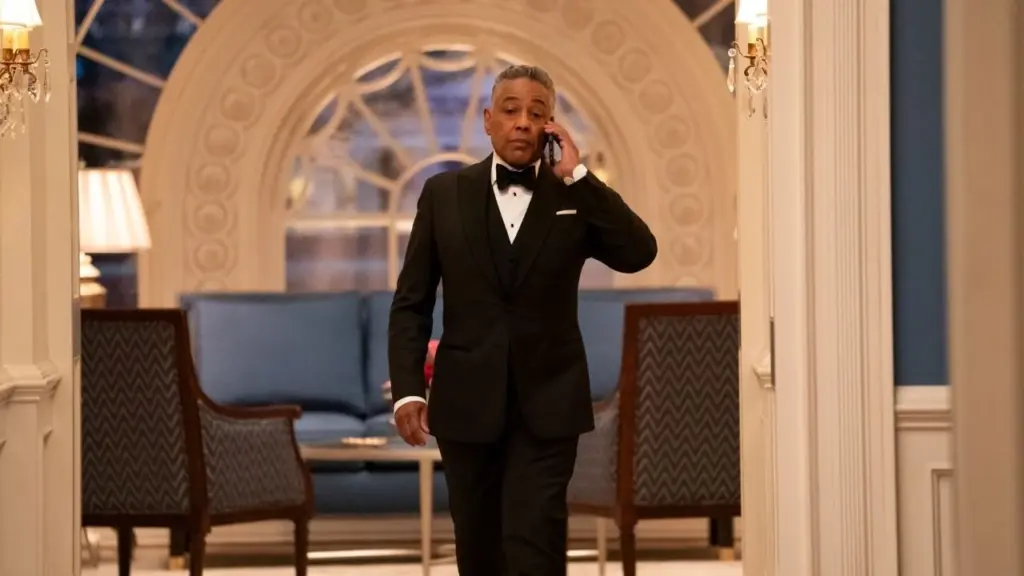
As written by Paul William Davies, the show’s witty dialogue metes out details and clues while framing and re-framing the narrative through various perspectives. At the outset, the whos, whats, wheres, and whens are being pored over by a Congressional hearing led, in life-imitates-art fashion, by former senator and Saturday Night Live alum Al Franken. His befuddled interrogatives (often interrupted by a conspiracy-minded, MGT-like competing senator, played by the likable Eliza Coupe) drop us into many of the building’s 132 rooms, 6 stories (if you count the basements), and surrounding gardens. Though obviously not filmed at the White House, the show uses a combination of holy-$#&!-these-are-elaborate sets and state-of-the-art computer rendering to the point where you feel like a fly on the wall and/or spy drone floating through halls of executive power and peccadilloes. This gives The Residence something many mystery programs lack or struggle to establish: visual vitality.
Mystery stories often take place in large houses, with hidden passages that allow for carefully plotted comings-and-goings of numerous people. The White House proves to be the ideal such setting, and as a bonus, the volatile relationships and ambitions of its workers and occupants combine aspects of Downton Abbey with The West Wing. Though the show avoids realpolitik, and its characters (including its president, thank god) are entirely fictional, its simulacrum of White House operations goes to virtual lengths reminiscent of James Cameron recreating the Titanic.
Based on the thorough behind-the-scenes journalism of Kate Anderson Brower’s book The Residence: Inside the Private World of the White House, the show’s goal is to give audiences a potent “you are there” experience throughout the unfolding mystery, and it fully delivers. At times it’s almost too much, as in an early episode where it seems the writer got carried away recounting the history of White House food preparation, but mostly the attention to history is rewarding.
The Residence‘s core concept alone isn’t what makes it a bingeable show; the ace up its sleeve is the enigmatic detective, Cordelia Cupp, hired as a consultant by the Metropolitan Police Department (in spite of jurisdictional jockeying by the FBI and other agencies, including the National Park Service). Cupp is played by Uzo Aduba, a distinct actress with a large, commanding face and a wild, Thing 1 (or is it Thing 2?) head of frizzled hair. I thought Aduba looked familiar but couldn’t place her — then I realized, ohhhh, she was the prison character “Crazy Eyes” so long ago on Orange Is the New Black, one of the first shows ever produced by Netflix or any other streaming service. In The Residence, though Aduba’s eyes are no longer crazy, she uses them to disarming effect — often just by holding them blankly open, inquiringly, hypnotically.
Esteemed documentarian Errol Morris had a highly effective method of interviewing where he’d ask open questions and then, instead of immediately asking follow-up questions, he’d hold still and wait. The people interviewed, feeling validated by Morris’s focused attention, and uncomfortable with the awkward silence of his non-reaction, would naturally keep talking and peeling away their own psychological layers — as if responding to implicit prompting. Cordelia Cupp uses a similar technique: a subtly accusatory gaze under which interview subjects reveal previously withheld information.
This “trick” becomes a running gag throughout The Residence. So too does Cupp’s enthusiasm for birdwatching — a topic she brings up at key moments, much like Daniel Craig’s similarly alliterative Benoit Blanc’s ruminations on Thomas Pynchon novels and nesting-egg donuts in the first Knives Out film. She even steps out, mid-investigation, to raise binoculars skyward hoping to see rare birds from the White House lawn, before returning inside to question the dodos.
Among Cupp’s other quirks is snacking on small tins of fish, much to the olfactory chagrin of Edwin (Randall Park), an out-of-his-depth FBI Agent who reluctantly becomes her assistant throughout the show. Whereas other detectives try to avoid red herrings, Cupp prefers to gobble them with a fork.
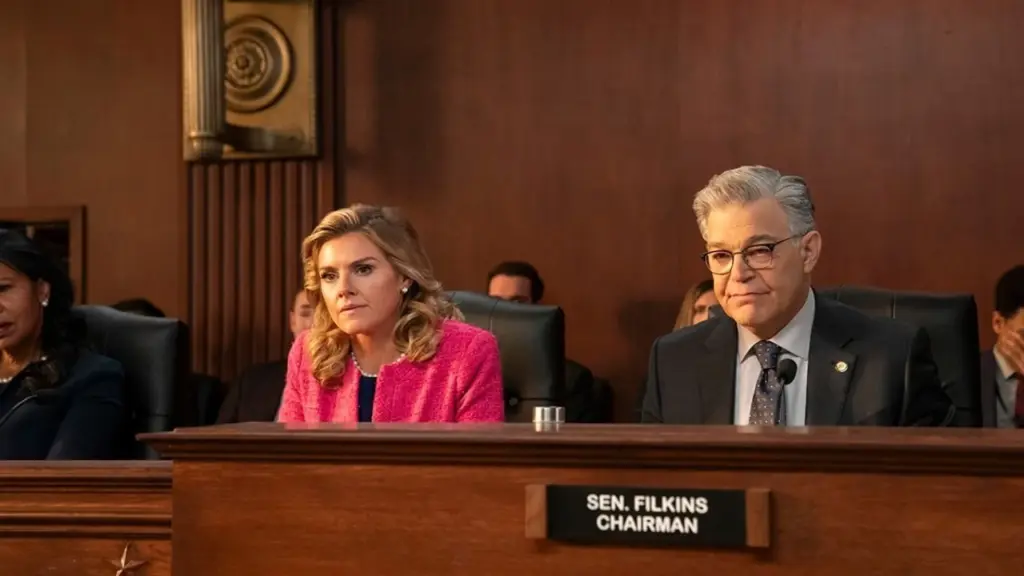
Uzo Aduba’s performance marks the creation of a genuinely original new detective, on par with not just Benoit Blanc but the full gallery of sleuth icons: Sherlock Holmes, Miss Marple, Hercule Poirot, Charlie Chan… Aduba’s calmly pursed lips, lightly sarcastic and terse rejoinders, and self-amused confidence make her a worthy centerpiece for this sprawling tableau. That said, I can see why Netflix has opted not to turn The Residence into a series, as I’m not sure Cupp’s birdwatching and suspect-staring bears repeating, and of course there’s really no way to repeat such a site-specific premise without cheapening the whole thing, or throwing out the “residence” premise entirely. (What would they do next: A murder at Monticello?)
I did enjoy the show’s brief interludes hinting at Cordelia Cupp’s backstory (her childhood impetus to solve a household mystery makes a sweet mini-mystery), as well as sending her off to Ecuador to birdwatch and dismantle clues from afar — a momentum-disrupting story approach Agatha Christie sometimes used. I also enjoyed the ongoing nods to great crime stories, such as the episode titles (The Last of Sheila, The Third Man, The Trouble With Harry) and references to Christie classics — The Murder of Roger Ackroyd and Murder on the Orient Express among them — at roughly the same part of the story when mystery afficionados might be speculating the type of twists those milestones represent.
Aduba’s performance is well-supported by a cast that includes numerous comedy veterans, including both SNL‘s Franken and vodka-soaked Jane Curtin, alongside shouty Ken Marino (from The State), pastry chef Bronson Pinchot (barely recognizable to those remembering him as the lemon-twist guy from Beverly Hills Cop), and Jason Lee — who, surprisingly, is exceptionally good as the slovenly live-in brother of the president, ensconced in an upper room to keep him from becoming a national embarrassment. A generous helping of terrific character actors, such as Isiah Whitlock Jr., turn what easily could be tiresome labyrinthine storytelling into something joyful.
I won’t attempt to summarize all the suspected killers, if indeed there even is a killer (there are indications of suicide), and I recommend anybody interested in the show put on their horse blinders so they can enjoy the proceedings free of spoilers.
I will say, though, that the show does not skimp on full characterization, substantial motives, and an array of clues laid out, one by one, with thoughtful care. The Residence plays fair in the sense that it always eventually returns to breadcrumbs it dropped earlier, though I’m still trying to figure out what was going on with the illegible Executive Calligrapher. The interpersonal dynamics of White House denizens provides plenty of material to fill out eight episodes. Prop-strewing sexual trysts, fuming workplace resentments, drunks serving drunkards, and even (out of left field) an affecting romance share screen time with historical info about Teddy Roosevelt, color-coded room geography, and odd minutiae about the homosexual, persnicket president’s (Paul Fitzgerald) overwrought obsession with scalding shower heat and water pressure.
Even if there’s no way to outsmart the detective (a possibility only in the best-calibrated mystery novels), the conclusion Cordelia Cupp finally reaches — after an epic explanation involving more rooms, objects, and characters than an all-night Clue tournament — is satisfying. Though not the least bit preachy, The Residence does eventually hint at a well-earned thematic agenda tying the mystery to our current, mission-critical need to reclaim American values.

